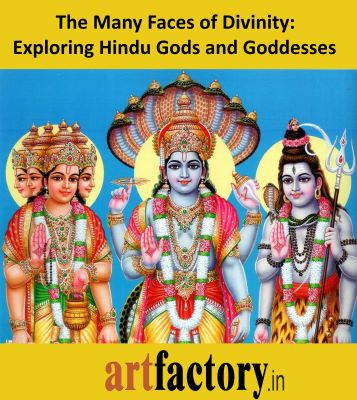
The Many Faces of Divinity: Exploring Hindu Gods and Goddesses
Introduction
Hinduism, one of the oldest living religions, is rich with mythology, symbolism, and a deeply spiritual connection to nature and the cosmos. At the heart of Hinduism lies a pantheon of Hindu Gods and Goddesses, each embodying distinct qualities, energies, and cosmic principles. Far from being mere mythological figures, these deities represent the divine aspects of consciousness, nature, life, and karma. Understanding their significance in Hinduism not only enriches spiritual knowledge but also offers insight into how billions of devotees live, pray, and find purpose in their everyday lives.
1. Who Are Hindu Gods and Goddesses?
Hinduism doesn’t follow a single deity but embraces divine plurality. There are 33 crore Hindu Gods and Goddesses, but the most widely worshipped ones fall under three main categories: the Trimurti (Brahma, Vishnu, Shiva), Tridevi (Saraswati, Lakshmi, Parvati), and various avatars and regional deities.
These deities are manifestations of Brahman, the ultimate reality or universal spirit. Each God and Goddess in Hinduism symbolizes specific virtues, cosmic functions, and life lessons. Worshiping them helps align one’s energies with higher consciousness and dharma.
2. The Trimurti: Brahma, Vishnu, Shiva
Brahma – The Creator
Brahma is the God of Creation. He is usually depicted with four heads, representing the four Vedas. While not widely worshipped in temples today, Brahma’s role in creating the universe marks the beginning of cosmic cycles.
Vishnu – The Preserver
Vishnu is the God of Preservation, responsible for maintaining the balance of good and evil. He incarnates in different avatars like Rama, Krishna, and Narasimha to protect dharma. Vishnu is central to Vaishnavism and symbolizes compassion, order, and protection.
Shiva – The Destroyer
Shiva, or Mahadeva, is the God of Destruction and Transformation. He represents the inner journey, meditation, and liberation from illusion (maya). Devotees worship Shiva for spiritual awakening, healing, and transformation. His forms include Nataraja, Ardhanarishvara, and Lingam.
3. The Tridevi: Saraswati, Lakshmi, Parvati
Saraswati – Goddess of Wisdom
Saraswati is the Goddess of Knowledge, Music, and Learning. Students and scholars seek her blessings during studies, exams, or while pursuing the arts. She represents clarity, wisdom, and the power of speech.
Lakshmi – Goddess of Wealth
Lakshmi, the consort of Vishnu, is the Goddess of Prosperity, Wealth, and Fortune. She is worshipped widely during Diwali and symbolizes both material and spiritual abundance.
Parvati – Goddess of Power
Parvati, Shiva’s consort, manifests in multiple forms such as Durga and Kali. She represents Shakti (divine feminine energy), motherhood, strength, and transformation.
4. Other Prominent Hindu Deities and Their Significance
Hanuman – The Devotee God
Hanuman is a symbol of devotion, strength, and service. Worshiped for courage and protection, Hanuman is considered an ideal devotee of Lord Rama.
Ganesha – Remover of Obstacles
The elephant-headed Lord Ganesha is the God of Beginnings and Remover of Obstacles. He is invoked before any auspicious work, including business ventures and rituals.
Krishna – The Divine Lover and Guide
Lord Krishna, an avatar of Vishnu, is known for his teachings in the Bhagavad Gita and his role in the Mahabharata. He symbolizes divine love, wisdom, and dharma.
Rama – The Ideal King
Lord Rama, another avatar of Vishnu, represents the epitome of dharma, justice, and morality. His life story is told in the Ramayana, inspiring millions to lead righteous lives.
Durga and Kali – Fierce Forms of Feminine Energy
Durga and Kali are fierce manifestations of Shakti. Durga slays evil forces, while Kali destroys ego and ignorance. Both represent empowerment and protection.
5. Symbolism in Hindu Gods and Goddesses
Each deity carries symbolic items and has unique mounts (vahanas). For instance:
Ganesha’s mouse symbolizes humility and desire.
Vishnu’s conch and chakra represent sound and time.
Shiva’s trident (trishula) represents the triad of creation, maintenance, and destruction.
These symbols convey spiritual messages and life principles beyond physical representations.
6. Worship and Festivals
Hindu Gods and Goddesses are worshiped through rituals, mantras, bhajans, pujas, and festivals like Navratri, Diwali, Janmashtami, Maha Shivratri, and Ram Navami. Each festival aligns with cosmic events and seasons, enhancing spiritual growth and community bonding.
7. Why Understanding Hindu Gods and Goddesses Matters
Studying Hindu deities isn’t just about religion; it’s about understanding the nature of the self, karma, dharma, and the universe. It helps navigate life’s challenges with clarity, faith, and resilience. The Gods and Goddesses of Hinduism offer metaphors and guidance for inner transformation.
Conclusion
Hindu Gods and Goddesses are not just idols of worship but archetypes of divine energy. Each one offers insight into the spiritual path, emotional intelligence, and moral living. Whether you seek wisdom (Saraswati), wealth (Lakshmi), strength (Hanuman), or liberation (Shiva), there's a deity guiding the way. Embracing their significance can lead to a more enlightened and purpose-driven life.
FAQs :
1. Who are the main Hindu Gods and Goddesses?
The main Hindu deities include Brahma, Vishnu, Shiva, Lakshmi, Saraswati, Parvati, Ganesha, Hanuman, Rama, Krishna, Durga, and Kali. Each represents a unique aspect of cosmic energy and human consciousness.
2. Why are there so many Gods in Hinduism?
Hinduism believes in one Supreme Consciousness (Brahman) that manifests in multiple forms to help humans understand and connect with the divine in ways that resonate with their individual paths.
3. What is the significance of Hindu Goddesses?
Hindu Goddesses embody Shakti, the divine feminine energy. They represent wisdom (Saraswati), wealth (Lakshmi), strength (Durga), and compassion (Parvati), playing vital roles in cosmic balance.
4. What is the difference between Vishnu and Shiva?
Vishnu is the preserver who maintains the universe, while Shiva is the destroyer and transformer, leading souls towards liberation. Both are essential in the cycle of creation and spiritual growth.
5. What do the symbols in Hindu Gods and Goddesses represent?
Each symbol—like Shiva’s trident, Vishnu’s chakra, or Ganesha’s mouse—holds deep metaphysical meanings, teaching spiritual values, virtues, and universal truths.
For more details,visit:https://www.artfactory.in/category/spiritual/om

Comments : (0)